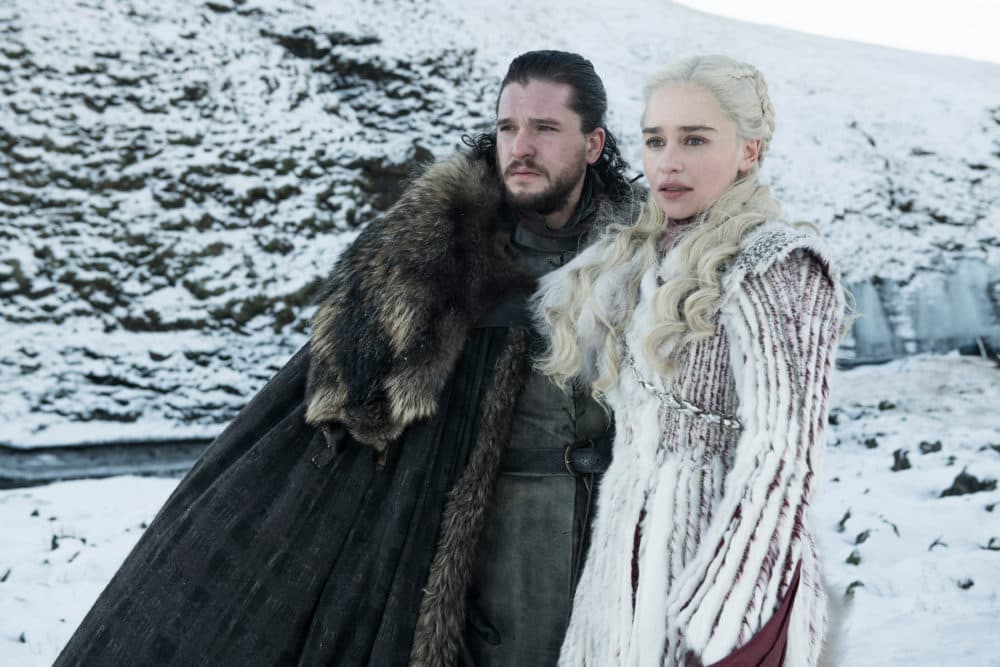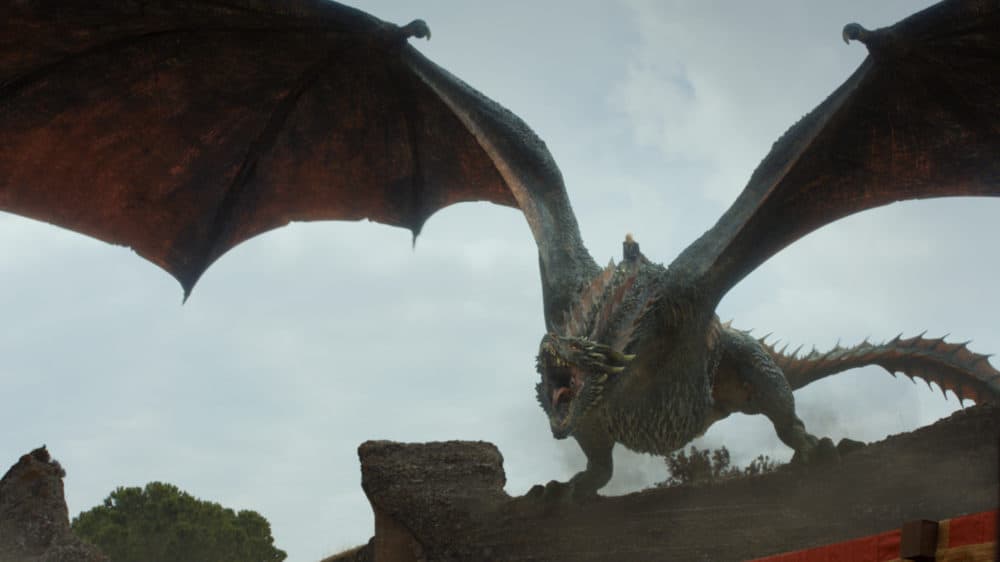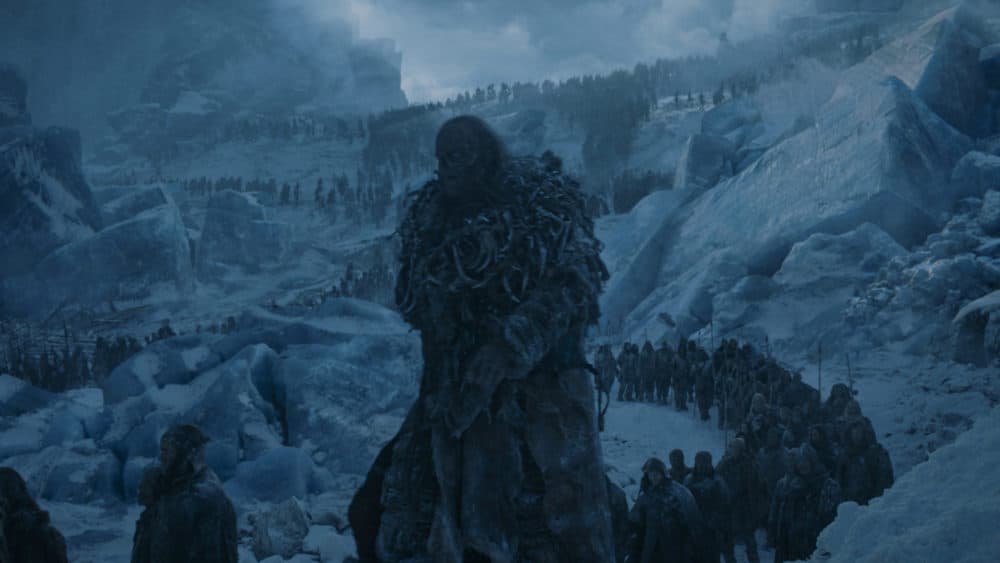Advertisement
Commentary
What Does 'Game Of Thrones' Have To Do With Climate Change? Oh, Everything

Editors’ Note: This piece assumes some knowledge of the HBO drama series “Game of Thrones.” It includes spoilers.
I came to “Game of Thrones” late in the game. Feeling lame about the hundreds of pop culture references flying over my head — “Winter is coming?” Huh? — I gifted my husband the “GoT” boxed set for his birthday, and we spent a year catching up with the dragons and giants of Westeros.
The eighth and final season of "Game of Thrones" starts Sunday. But my moment of realization — when "GoT" morphed from entertainment to existentialism — came in Season 7, episode 7.
About halfway through the episode, hero Jon Snow tries to convince warring factions to join forces against a common enemy: an army of zombies assembling in the north. But the various leaders don’t believe the zombies exist, and the discussion deteriorates into sniping and name-calling.
Snow steps between the two groups and announces, impatiently:
“The same thing is coming for all of us: a general you can’t negotiate with, an army that doesn’t leave corpses behind on the battlefield.”
To prove the point, Snow’s strongman unchains a wooden box and releases its contents: a screaming, rag-clad zombie who runs full-tilt, hissing and jittering, toward the enemy queen.
Jon Snow kills the zombie with a shard of obsidian, and turns to the queen: “There is only one war that matters. The great war. And it is here.”
I hit the pause button and turned to my husband: “This is all about climate change.”

“You think everything is about climate change,” he said. “This,” he pointed at the screen, “is about zombies.”
He is wrong, of course, and I am right. Because, as an environmental journalist and Mother of (two) Dragons, I am an expert on climate change and “Game of Thrones.”
Let’s look at the evidence. In “GoT”:
- A global shift in climate, long predicted, emerges
- A huge, icy structure crumbles
- The climate shift allows noxious pests to move beyond their traditional habitat
- … And forces people from their ancestral homes
- Even as evidence of these threats mount, squabbling nations deny their existence
In “Game of Thrones,” the climate is getting colder; our own is warming, but whatever. Their wall is Greenland’s glaciers (or Antarctica’s). Their zombies are our toxic algae, ticks and adeus egypti mosquitoes. Their Wildings are our climate refugees, and squabbling nations are our squabbling nations, with fewer beheadings but plenty of backstabbing. Their crisis mirrors our own.
A colleague pointed out that I am not the first person to draw this conclusion. George R. R. Martin, who wrote the series on which “Game of Thrones” is based, told the New York Times last fall that there’s a “great parallel” between his story and our current climate crisis.
Climate change, Martin says, “has the potential to destroy our world. And we’re ignoring that while we worry about the next election and issues that people are concerned about, like jobs.”
Winter is here. Climate change will hit us hard, and it will hit the most vulnerable among us the hardest.
“Jobs are a very important issue,” he adds. “All of these things are important issues. But none of them are important if, like, we’re dead and our cities are under the ocean.”
Martin’s characters agree with their creator. One of “GoT’s” bad guys, upon witnessing Jon Snow killing the zombie, decides to flee back to his island home to hide. “I’ve seen everything — things you couldn’t imagine,” he says. “This is the only thing I’ve ever seen that terrifies me.”
Many people I know feel the same way. Each Intergovernmental Panel on Climate Change (IPCC) report brings a flurry of emails and texts from panicked friends, looking for a bit of hope. Who is our Jon Snow? Who is our Danerys Targarean? And, where, oh where, are our dragons?
Good question.

I spend most of my time talking to scientists, politicians, policy wonks and regular people who are taking big and small steps to fight climate change: scientists converting spent cranberry bogs to salt marshes, students advocating for old trees, colleges committing to composting, moms working with gas companies to fix leaky pipelines, a Republican governor supporting wind power and proposing a carbon tax. I don’t necessarily agree with all these steps (and as a journalist I don’t advocate for any of them); but as a human, it's heartening to see action on many fronts.
Is it enough to stop climate change? Nope. Winter is here. Climate change will hit us hard, and it will hit the most vulnerable among us the hardest.
I have two kids, ages 9 and 11, and I talk to them about climate change a lot. Our family spends summers in Breezy Point, New York, which was walloped by Hurricane Sandy and is still rebuilding. When we walk on the beach, we discuss sea level rise and super storms (and ocean warming and plastic pollution), and whether their beloved Coney Island will be under water in 50 years.
My kids know that the world is changing. But I tell them that they will make it better, and be better for it. They’ll build a world with far less consuming and much more recycling, reusing and upcycling. They’ll walk and bike because it will be cheaper than driving. They’ll eat less processed food with less packaging. Their houses will send electricity back to the grid. And all these things will be common sense, not political footballs.
I have a similar hope for the last season of “Game of Thrones.” My fervent wish is that Tyrion Lannister and Sansa Stark end up sharing the throne. They’ve both been through hell, and emerged as clear-eyed pragmatists. (And they are married, right? It’s hard to keep track.) The citizens of Westeros would see less drama under their leadership, true. They might even have a chance of surviving the long winter.
